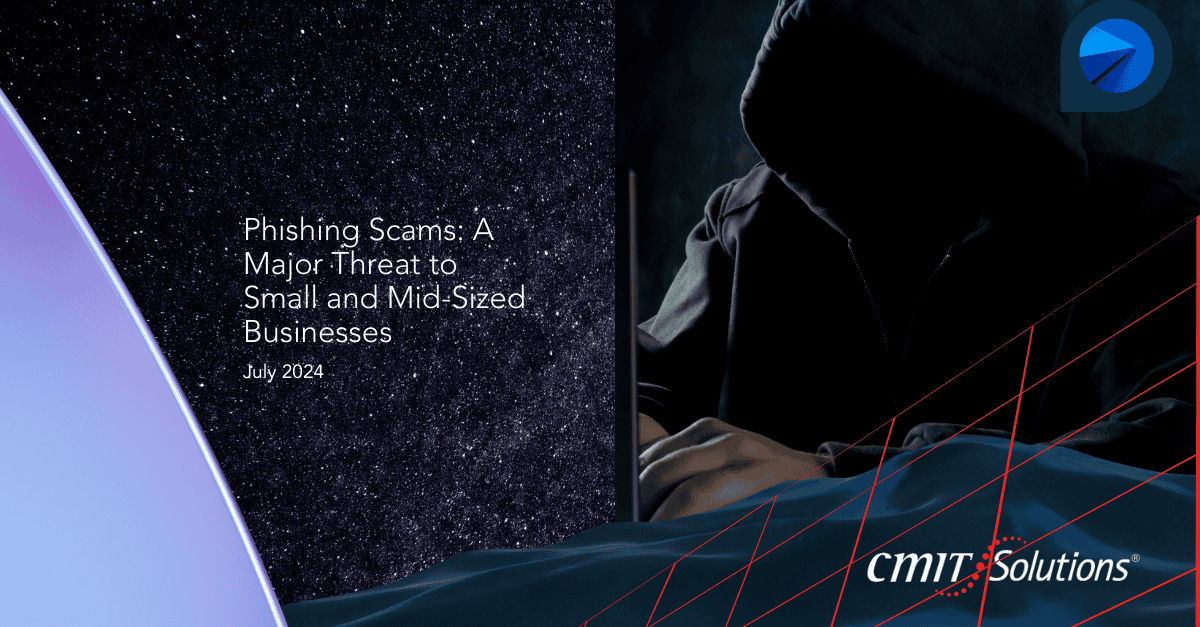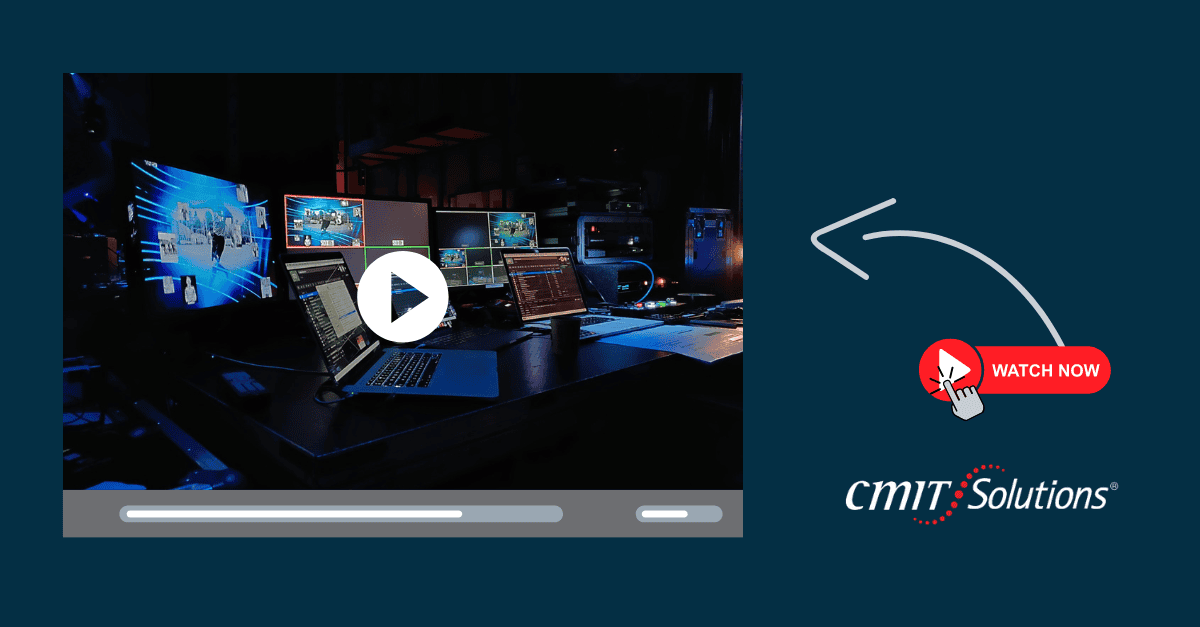Phishing has become a formidable menace for small and medium-sized enterprises (SMEs). It’s a deceptive practice where cybercriminals impersonate legitimate institutions to dupe people into disclosing confidential information, leading to substantial financial damage for companies.
This blog is dedicated to exploring the risks associated with phishing threats, the sophisticated tactics cybercriminals deploy, and the proactive defenses businesses can establish to safeguard themselves.
Decoding the Phishing Menace
Phishing is a crafty form of cyber attack designed to swindle individuals into handing over sensitive data like usernames, passwords, and financial details. These criminals disguise themselves as credible sources, luring victims through emails to tap on harmful links or download malware-ridden files.
The rise of the COVID-19 pandemic and the massive shift towards remote working have fueled a spike in phishing incidents. Companies with less stringent security arrangements, especially those operating from home settings, are prime targets for these digital predators.
Phishing scams often begin with an innocent-looking email. The email might appear to be from a trusted source, such as a bank, a well-known company, or even a colleague. It may contain a link or an attachment that, once clicked or downloaded, can install malicious software on the victim’s computer. This malware can then steal sensitive information, such as login credentials or financial data, or even take control of the victim’s computer.
For more information on managed IT services and how they can help protect against phishing threats, visit CMIT Boston, Newton, Waltham.
Why Phishing is a Pressing Issue for SMEs
For small and mid-sized businesses, the threat of phishing looms large. Many of these businesses lack the financial muscle to deploy advanced cybersecurity infrastructure. Moreover, there’s a notable gap in employee training to recognize and deflect phishing schemes, leaving firms at heightened risk.
Phishing attacks can have devastating consequences for SMEs. They can lead to financial losses, reputational damage, and legal liabilities. SMEs are often targeted by cybercriminals because they typically have fewer resources to devote to cybersecurity and may be seen as easier targets compared to larger organizations.
It’s crucial for SMEs to understand the importance of cybersecurity and to take proactive steps to protect themselves from phishing threats. Employee training is a critical component of any cybersecurity strategy. Employees should be educated on how to recognize phishing emails and what to do if they receive one.
Learn more about how CMIT Boston, Newton, Waltham can help protect your business from phishing attacks at Managed IT Services in Boston.
The High Stakes of Falling Prey to Phishing
The aftermath of a successful phishing exploit can be dire for any business. It can freeze bank accounts, disrupt operations, and even lead to legal repercussions from affected customers or partners. The financial, legal, and reputational harm can be catastrophic, especially if sensitive data governed by regulations like GDPR is compromised.
Phishing attacks can result in significant financial losses for SMEs. Cybercriminals can use stolen credentials to access bank accounts, make unauthorized transactions, or steal sensitive information. The cost of recovering from a phishing attack can be substantial, including expenses related to IT support, legal fees, and regulatory fines.
In addition to financial losses, phishing attacks can cause reputational damage. Customers and partners may lose trust in a business that has been the victim of a cyber attack. This loss of trust can result in decreased sales, loss of business opportunities, and long-term damage to the company’s reputation.
To learn more about how CMIT Boston, Newton, Waltham can help protect your business from phishing attacks, visit Keep Your Business Protected From Cyber Threats.
The Arsenal of Phishing Scams
Cybercriminals employ a variety of phishing techniques to deceive their victims. These techniques are constantly evolving, making it challenging for businesses to keep up with the latest threats. Here are some of the most common types of phishing scams:
Email Phishing
This prevalent method involves sending counterfeit emails that mimic those from banks or corporations, often prompting for personal or financial verification. These emails are designed to look legitimate and may include logos, signatures, and other elements that make them appear authentic. The goal is to trick the recipient into clicking on a link or downloading an attachment that contains malware.
Spear-phishing
Unlike broad-scale phishing, spear-phishing zeroes in on selected employees, utilizing in-depth knowledge about the organization for a more convincing deceit. Spear-phishing attacks are highly targeted and often involve extensive research on the intended victim. The attacker may use information obtained from social media, company websites, and other sources to craft a convincing email.
Vishing
Here, phone calls are the weapon of choice, with fraudsters feigning identities from banks or IT firms to wheedle out private information. Vishing, or voice phishing, involves using phone calls to trick victims into revealing sensitive information. The attacker may pose as a bank representative, technical support agent, or other trusted individual.
Smishing
Text messages become the conduit for fraud in smishing, instilling a false sense of urgency to provoke hasty, unverified responses. Smishing, or SMS phishing, involves sending text messages that appear to be from a legitimate source, such as a bank or government agency. The message may include a link to a fake website or a phone number to call.
Pharming
This more technical approach hijacks users to sham websites by corrupting the DNS system or executing man-in-the-middle attacks. Pharming attacks redirect users from legitimate websites to fraudulent ones. This can be done by compromising the DNS system or by using malware to modify the user’s hosts file.
For more information on how to protect your business from these types of phishing attacks, visit Managed IT for Financial Institutions.
Protecting SMBs Against Phishing Threats
The cornerstone of phishing defense is a robust set of security protocols. Here are key measures SMEs can adopt:
Employee Training
Educating employees on the nuances of phishing can turn them into a formidable first line of defense. Training should cover how to recognize phishing emails, what to do if they receive one, and the importance of reporting suspicious emails. Regular training sessions can help keep employees up-to-date on the latest phishing threats and techniques.
Strong Passwords and Multi-factor Authentication
Strong passwords and multi-factor authentication (MFA) can drastically impede unauthorized access. Employees should use complex passwords that are difficult to guess and should change them regularly. MFA adds an extra layer of security by requiring a second form of verification, such as a text message or authentication app.
Professional Firewalls
A reliable firewall can serve as a sentinel, warding off phishing intrusions. Firewalls can help prevent unauthorized access to a company’s network and can block malicious traffic. It’s important to regularly update and configure firewalls to ensure they are providing the best possible protection.
Regular Software Updates
Keeping systems current is critical for protection against emerging phishing strategies. Software updates often include security patches that address vulnerabilities that could be exploited by cybercriminals. Regularly updating software can help protect against the latest threats.
Work with a Cybersecurity Vendor or an MSSP
Working with a Managed Security Service Provider (MSSP) equips SMBs with expert security assessments, continuous monitoring, advanced technology, employee training, compliance guidance, and strategic planning to fortify their defenses against phishing threats. An MSSP can provide the expertise and resources that many SMEs lack in-house.
Because phishing threats are constantly escalating and evolving, SMBs have to place cybersecurity at the forefront. Through extensive security measures and continuous employee education, businesses can significantly mitigate their exposure to these digital onslaughts.
Talk to our security experts to see how CMIT Boston, Newton, Waltham can help keep your organization safe from phishing attacks. For more information, visit CMIT Boston, Newton, Waltham.
Conclusion
In today’s digital landscape, the threat of phishing scams looms large, particularly for small and mid-sized businesses. These deceptive tactics employed by cybercriminals can result in significant financial, legal, and reputational damage. Phishing scams are not just an inconvenience but a serious threat that requires proactive measures and continuous vigilance.
Phishing schemes are becoming increasingly sophisticated, making it imperative for SMEs to stay informed and prepared. By understanding the various forms of phishing, such as email phishing, spear-phishing, vishing, smishing, and pharming, businesses can better equip themselves to recognize and thwart these attacks.
The key to a robust defense against phishing lies in a comprehensive cybersecurity strategy that includes employee training, strong password policies, multi-factor authentication, professional firewalls, regular software updates, and partnering with a reliable Managed Security Service Provider (MSSP). These measures collectively form a formidable barrier against phishing attempts, ensuring that sensitive information remains secure.
At CMIT Boston, Newton, Waltham, we are committed to helping businesses navigate the complex landscape of cybersecurity. Our expertise in managed IT services and cybersecurity solutions positions us as a trusted partner in safeguarding your business from phishing threats. By working with us, you can leverage our knowledge and resources to create a secure environment for your operations.
Phishing is a dynamic and evolving threat, but with the right approach and vigilant practices, it is possible to significantly reduce the risk. Investing in cybersecurity is not just a necessity; it is a strategic decision that protects your business’s future.
For more information on how CMIT Boston, Newton, Waltham can help protect your organization from phishing attacks, visit our website. Let us help you build a resilient defense against cyber threats, ensuring your business remains safe and secure in an ever-changing digital world.






